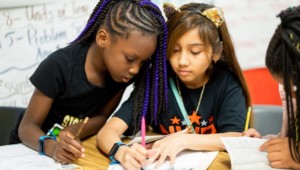Getting Personalized Learning Right the First Time

By Karla Phillips-Krivickas and Ace Parsi
This post is the second in a three-part series. Read the first post here.
Facing the daunting challenge of preparing all students for college, career and civic success, educators, students and their families are caught in a persistent churn of educational reforms and innovations, one following the other. But have these innovations really moved the needle for students with disabilities? If not, why? For answers, let’s consider the standard playbook for far too many reforms:
- Identify a challenge facing the system;
- Create a strategic plan to address that challenge with aspirations for how your strategy will address the needs of all learners;
- When reality bumps against aspirations, create a subcommittee to think through how the plan and its associated investments can be modified to address the needs of students with disabilities and other struggling learners; and
- When that fails, go back to the drawing board and repeat.
The persistent incapacity of the system to change shouldn’t be a surprise—we are often stuck retrofitting well-intentioned ideas for students whose needs were too complicated to fit into our original models in the first place.
Approaches to personalized learning are riding the wave of educational innovation. If implemented well, the benefits for students with disabilities and other struggling learners are numerous and exciting: more engaging educational experiences, systems focused on students’ challenges, strengths and interests, multiple ways to access content, and on-time, targeted supports. It’s because we are excited by this potential that we are adamant that the new approach must be designed for the success of all learners.
Specifically, we encourage implementers to place the challenges that students with disabilities (and other struggling learners) might face in personalized learning systems at the forefront, create a strategic plan to address those challenges, and believe that in the process, it is not only students with disabilities that benefit, but all other non-average learners as well. After all, the fundamental fallacy in our past approaches to reform and innovation—as Todd Rose points out so skillfully—is that while the average learner is convenient for our models, in reality that learner doesn’t exist.
With interest growing and momentum building, it’s important to take a moment to reflect on the five leading challenges educators, schools, districts and states scaling personalized learning must attend to:
- Meeting students where they are while maintaining high expectations. -Personalized learning shouldn’t be seen as an exit lane from holding ourselves accountable to high expectations for all learners. States, districts, and schools should set high expectations of knowledge, skills and dispositions essential for 21st-century success of all learners and hold themselves accountable for that success.
- Educator capacity must also evolve. Personalized learning isn’t just about new student competencies, but new educator competencies as well. Teachers, leaders and paraprofessionals will need specific skills to support the success of students with disabilities. This includes competencies to collaborate across general and special education, interpret and use new data within these systems, and implement frameworks such as universal design for learning.
- Ensuring accessibility must be intentional. Schools embarking on this transition must be strategic and intentional with every decision. Every investment a school or district makes in supporting personalized learning—from learning management systems and blended learning platforms procured to internship programs facilitated—needs to be accessible to the range of diverse learners in our classrooms.
- Many struggling learners will still need additional support. The inconvenient reality of personalized learning systems is that many struggling learners enter them in higher grades already considerably behind their peers, and many others will need significant supports to master more rigorous knowledge, skills and dispositions. States, districts and schools interested in personalized learning must make significant investments in 21st-century multi-tiered systems of support to ensure that personalized learning leads to closing rather than widening learning gaps.
- Parent engagement must be a priority. Parents of students with disabilities and other struggling learners aren’t new to the educational reform game, and rightfully might approach personalized learning conversations skeptically given past broken promises and failures. States, districts and schools must be intentional about communicating the need for and practical differences in the experiences personalized learning systems invite, and be proactive in engaging parents in the initiative’s success.
Personalized learning challenges us not only to think differently about how we deliver learning, but how we conceptualize innovation and change management. This is a great opportunity, and with this opportunity comes the responsibility to do it right.
For more, see:
- Starting Over with Personalized Learning
- New Personalized Learning Report for Parents and Communities
- How do we Ensure Personalized Learning is a True Equity Initiative?
This post is the second in a three-part series bringing to a close our February editorial focus of “Readiness for All.” Check back on February 28th to see the final installment, and get ready for March, when our focus will be “Creating Powerful Learning Experiences.”
Karla Phillips-Krivickas is the Policy Director for Competency-Based Education at the Foundation for Excellence in Education. Follow her on Twitter: @azkarla.
Ace Parsi is the Personalized Learning Partnership Manager at the National Center for Learning Disabilities (NCLD). Follow them on Twitter: @ncldorg
Stay in-the-know with all things EdTech and innovations in learning by signing up to receive the weekly Smart Update. This post includes mentions of a Getting Smart partner. For a full list of partners, affiliate organizations and all other disclosures, please see our Partner page.
Guest Author





0 Comments
Leave a Comment
Your email address will not be published. All fields are required.